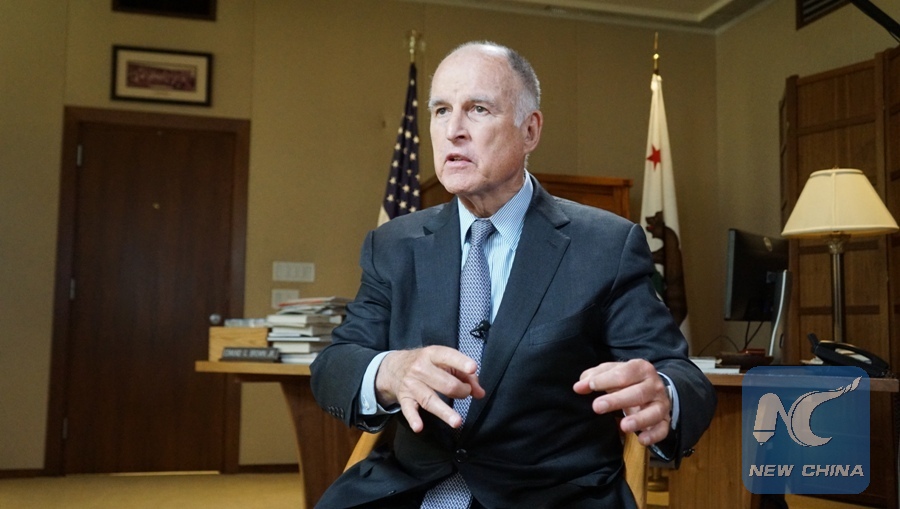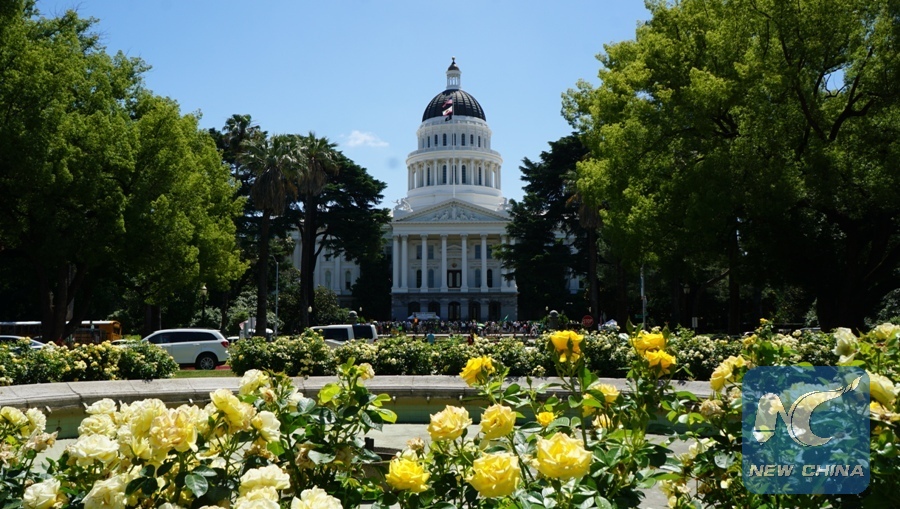
Governor Jerry Brown of the U.S. state of California speaks during an interview with Xinhua at his office in the state capital of Sacramento on May 31, 2017. (Xinhua/Xu Yong)
SAN FRANCISCO, June 3 (Xinhua) -- Governor Jerry Brown of the U.S. state of California left for China on Friday, seeking opportunities for cooperation in fighting climate change as well as other areas.
Brown's detour journey to China came after U.S. President Donald Trump announced on Thursday that the United States would withdraw from the Paris Agreement on climate change.
On Thursday, Brown responded strongly to Trump's announcement, vowing to "resist" the administration's course of action and to "fight" for what is good for global well-being.
Brown has said that it is imperative to act now and together with his Chinese counterparts against climate change.
Brown has the very reason for a strong response to Trump's decision as California has suffered a lot from nature in recent years, like wild wood fires and drought.

Photo taken on May 31, 2017 shows the State Capitol of California in Sacramento, the United States. (Xinhua/Xu Yong)
"In California already, our fires are not just in the summer, but are for most of the year," Brown told Xinhua at his office in the state capital of Sacramento on Wednesday.
"China was the leader, with America, to create the Paris agreement," Brown noted.
Now, without Washington, China becomes all that more important, said the governor. He expressed the hope that California will work closely with other U.S. states, Chinese provinces, regional blocs like the European Union and other nations.
Brown is advocating a subnational coalition stemming from what is known as Under2 MoU, a memorandum of understanding signed or endorsed in the past two years by 170 jurisdictions, namely cities, states, provinces and countries around the world, to commit themselves to limiting the increase in global average temperature to under 2 degrees Celsius.
The Under2 Coalition emerged in May 2015 as 12 jurisdictions signed the memo in Sacramento.
The Paris Agreement was adopted by 196 parties in 2015 and it went into effect in November 2016. The pact sets a target of holding the global average rise in temperature below 2 degrees Celsius above pre-industrial levels, and preferably below 1.5 degree Celsius.
"Our coalition here, of ... states and provinces, represent over 1 billion people," Brown told Xinhua.
Now representing 33 nations and six continents, the Under2 Coalition claims to represent 27.5 trillion U.S. dollars in gross domestic product, equivalent to 37 percent of the global economy.
"It is urgent, because what we do today will create irreversible consequences in the years ahead. Time is running out," said Brown.
Brown's week-long China trip will take him to Chengdu, Nanjing and Beijing, where he will host a clean energy forum with Chinese authorities and participate in climate-related events.
In Chengdu and Nanjing, he will attend events dedicated to clean technology and environmental protection, in an effort to forge greater regional climate collaboration and action.
Of the 13 meetings and remarks listed, 10 are related to efforts of fighting climate change.
"In 10, 15, 20 years or in the future, the seas will be rising, the weather will be becoming far less benign, it is imperative that we act," said Brown.
Given what is going on in Washington D.C. with the current U.S. administration, he said, "it is imperative that China succeeds."
Chinese Premier Li Keqiang said Thursday in Berlin that China will continue to implement the commitment of the Paris climate deal and "move toward the 2030 goal step-by-step steadfastly."
"The Paris Agreement was a hard-won result," Chinese Foreign Ministry spokesperson Hua Chunying said Thursday, noting that climate change is a global challenge and no country can remove itself from the issue.
Even if other countries change their positions, China will continue its plan of innovation, coordination, green development, opening-up and sharing, she said.
Brown said: "We need to collaborate. It is not about one nation being the winner. It is about all nations dealing with the common threat. This is mutually beneficial."

